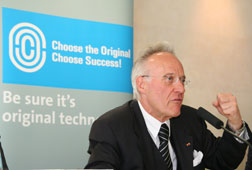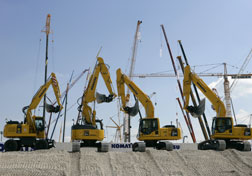
Tudor Hampton/ENR Wutzlhofer: 'Awareness' can quash patent pilferers.
|
Instead of keeping a low profile, Chinese equipment vendors stuck out their necks at the Munich megashow by upping their exhibit footprint by a factor of seven, for a total of 13,200 sq meters, since the last triennial event was held in 2004. Bauma show officials did not make any attempt to restrain them.
Show officials say they prescreened suppliers’ machines for authenticity before allowing them to roll onto the show floor. “Originals are welcome here,” said Manfred Wutzlhofer, chairman and chief executive of Bauma owner Messe München GmbH.
In an effort to combat nonoriginal machinery, German manufacturers have devised a new plan to target patent thieves by killing them with kindness and better marketing. Rather than using profits to sue offenders in drawn-out and tenuous international legal proceedings, the German manufacturers say they plan to out-advertise the competition and emphasize the advantages of their equipment.
|
Toward the wrap-up of Bauma’s first day on April 23, the German Engineering Federation, the nation’s leading equipment and technology trade group, unveiled a decal that federation members say they plan to stick on their machines around the world. The blue-and-white sticker displays a large letter “C” surrounded by circular lines that resemble a copyright symbol.
Growing Enthusiasm
The mark is intended to tout the safety, reliability and product support that users receive with a piece of original-manufactured equipment, similar to a “Made in America” bumper sticker but with a slightly more enthusiastic tone. It reads, “Choose the Original. Choose Success!” Some vendors had a head start by printing the logo on brochures on display at the show. “We need to bring about a change in awareness,” Wutzlhofer said.
“We want to concentrate on working and not defending,” explained Reinhold Festge, managing director of machinery at Haver & Boecker, an Oelde, Germany-based machine-tool and wire-mesh producer.
Patent protection is becoming a dicey game in developing countries, such as China, where protectionist governments often play the role of moderator. Five years ago, China had no method for private companies to secure intellectual property, patent experts say. New laws are pushing the pendulum in the opposite direction, they add.

Messe München GmbH/AlexSchelbert.de Vendors started their engines for a record-breaking Bauma.
|
By contrast, engineers in more mature markets such as Germany tend to look the other way when copying occurs. As long as all the players profit, no one minds, say industry sources.
“Plagiarists are sometimes seen to be better because there are improvements that can be implemented,” said Germany’s former chief patent judge, Volker K. Zeiler, who was at the Bauma show. But the Chinese “don’t have the experience and don’t have the finish of the ‘original’ products,” he added.
Zeiler applauded the German federation’s decal strategy. But he also advised equipment makers to keep filing international patents so they can lock in their interests. “Where there is no protection, you cannot sue,” said Zeiler.
More Company
Chinese companies are not alone anymore in the reverse-engineering game. Other top offenders reportedly are operating in Taiwan, Korea, India, Italy and Turkey. German equipment makers estimate copycat-related revenue loss at more than $6.8 billion a year, according to a just-released survey performed by the federation in March.
“This needs to be solved at the international level,” said Michael Glos, Germany’s federal commerce and technology czar, on the first day of the seven-day show. “We feel that it’s not being taken seriously enough by some countries.”
erman engineers kicked off an explosive industry show in Munich by lobbing verbal grenades toward the Far East. Always proud of their technical heritage, the German equipment makers at this year’s Bauma convention blamed engineering “piracy” and “copycat” patent infringement in China and other countries for costing them billions of dollars each year in lost sales.
 Related Links:
Related Links: 
Post a comment to this article
Report Abusive Comment